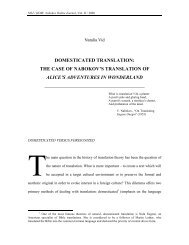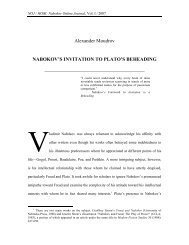Michael Maar Speak, Nabokov
Michael Maar Speak, Nabokov
Michael Maar Speak, Nabokov
Create successful ePaper yourself
Turn your PDF publications into a flip-book with our unique Google optimized e-Paper software.
<strong>Nabokov</strong> Online Journal, Vol. VI (2012)<br />
_______________________________________________________________________<br />
<strong>Speak</strong>, <strong>Nabokov</strong>, by <strong>Michael</strong> <strong>Maar</strong> / Transl. by Ross Benjamin. London, Verso, 2010:<br />
ISBN 978-1-84467-437-4, viii + 148pp. Bibliography. Index.<br />
I<br />
n <strong>Speak</strong>, <strong>Nabokov</strong>, <strong>Michael</strong> <strong>Maar</strong>, the author of Two Lolitas, presents evidence of the<br />
hidden biographical details, motifs and pathologies within <strong>Nabokov</strong>’s oeuvre which<br />
contribute to an altogether different picture of an artist, who throughout his career<br />
attempted to perform the impossible task of leaving only traces of his life within his writing.<br />
<strong>Maar</strong> proposes that “<strong>Nabokov</strong> trains his interpreters to be cabbalists”, who understand “that<br />
simple questions do not have simple answers” (vii). It was <strong>Nabokov</strong>’s hope “that one day a<br />
reappraiser will come and declare that, far from having been a frivolous firebird, I was a<br />
rigid moralist” (Strong Opinions). Indeed there have been many such reappraisers, who have<br />
expounded upon the moralistic qualities within <strong>Nabokov</strong>’s work, but it is <strong>Maar</strong>’s contention<br />
that none so far have penetrated as deeply into the depths which are hidden within ‘the<br />
charms of the surface’ (viii).<br />
Although these depths may be familiar to <strong>Nabokov</strong> scholars, there are nevertheless<br />
some very original insights within this book, which attempt to articulate what <strong>Maar</strong> describes<br />
as ‘The Horror behind the Shimmer’ (6). This short book, of fewer than 150 pages, comprises<br />
of nine thematic sections, each of which deserves further scholarly attention and debate but is<br />
unfortunately handled a little too briefly. Because of the quality of <strong>Maar</strong>’s prose, it is at times
<strong>Nabokov</strong> Online Journal, Vol. VI (2012)<br />
_______________________________________________________________________<br />
a compelling read, but will perhaps inevitably be subjected to charges of speculation and lack<br />
of evidence.<br />
As <strong>Maar</strong> recounts, the author himself described the writing of fiction as “a rare variety<br />
of madness” (Stories). The central thesis of the work lies in the notion that <strong>Nabokov</strong>’s<br />
relationship to reality was characterised by a sense of terror, which placed him precariously<br />
on the brink of madness – and how various incidents in his often tragic biography informed<br />
the distinctive genius of his prose. In the section Magician & Dwarf, these feelings of<br />
madness, which <strong>Maar</strong> defines as an ‘alternation between narcissistic dissolution and horror,<br />
between feelings of omnipotence and those of annihilation’ (10), were also felt by the<br />
German master Thomas Mann, a writer who often was often the victim of <strong>Nabokov</strong>’s<br />
mocking contempt. <strong>Maar</strong> presents evidence of the thematic parallels and motifs between<br />
Thomas Mann’s ‘Little Herr Friedmann’, and <strong>Nabokov</strong>’s short story ‘The Potato Elf’. He<br />
sums them up as ‘the artist as egomaniac; the outsider whose sorrow never ceases; the<br />
demonic, somewhat masculine woman; a whiff of misogyny; precise knowledge and<br />
outdoing of the competition’ (17). These conclusions stand out on the page, and may appear<br />
to be insinuation and speculation, if only because <strong>Maar</strong> seems to favour a certain type of<br />
writing style, usually beloved of Thriller and Mystery writers, which, while being<br />
entertaining, seems to detract from the quality of his arguments. This is unfortunate, as there<br />
are many brilliant insights. The author, for example, attributes <strong>Nabokov</strong>’s hatred of<br />
Dostoevsky, Freud and Mann to the commonalities which they shared. ‘The most brutal wars<br />
are civil and fratricidal’, he writes, and those writers occupied the ‘few posts in the<br />
borderland that <strong>Nabokov</strong> claims for himself alone’ (18).<br />
One of these borderlands is the realm of fairy tales, and the author suggests that<br />
<strong>Nabokov</strong>’s aesthetic disapproval of Mann is rooted in the Nobel Laureate’s appropriation of<br />
Hans Christian Andersen. Yet there is another reason, hinted at by <strong>Maar</strong>, as to why <strong>Nabokov</strong><br />
held such feelings of hatred towards Thomas Mann. Anyone who is familiar with Mann’s<br />
diaries, the author included, must have been aware of Mann’s anguishes about his sexuality<br />
and his dubious incestuous feelings towards his son Klaus, who he claimed to be in love with.<br />
<strong>Maar</strong> suggests that <strong>Nabokov</strong>’s antipathy was primarily linked to his disapproval of Mann’s<br />
homosexuality. The author maintains that “<strong>Nabokov</strong>’s work is a forest in which it is easy to<br />
lose oneself and see nothing but the trees.” (vii) Thus minute details, such as an account in<br />
<strong>Speak</strong>, Memory of how the young <strong>Nabokov</strong> may have been molested by his uncle, leads to<br />
the development of his compulsive and often belligerent homophobia, and the endless cast of
<strong>Nabokov</strong> Online Journal, Vol. VI (2012)<br />
_______________________________________________________________________<br />
negative, often pederastic and predatory, homosexuals which populate his novels. The<br />
problematic question of <strong>Nabokov</strong>’s homophobia has been addressed in the past, by Lev<br />
Grossman and Paul Allen Miller amongst others. Although the theme of sexuality takes up<br />
two chapters of this work, it tends to overshadow everything else which remains. <strong>Maar</strong><br />
believes that a great deal of the sexual themes in <strong>Nabokov</strong>’s oeuvre is a result of a<br />
pathologically compulsive attitude towards homosexuality and paedophilia.<br />
The chapter Ultima Thule addresses the possible influence Arthur Schopenhauer may<br />
have had on <strong>Nabokov</strong>, who was careful never to reveal a preference for the work of any one<br />
particular philosopher. <strong>Maar</strong> focuses on a remark which <strong>Nabokov</strong> made, during the course of<br />
a mountain hike with his son Dmitri, that his work was “like a film waiting to be developed.<br />
A sensation... akin to Schopenhauer’s vision of events as they unfold. 1 ” <strong>Maar</strong> examines the<br />
first chapter of the unfinished Solus Rex, ‘Ultima Thule’, where the character Adam Falter,<br />
through being struck by an ‘unearthly lightening’, is given a glimpse of Ultimate Truth which<br />
he cannot share with others. What follows is an interesting analysis of the philosophical<br />
dimensions of <strong>Nabokov</strong>’s work, and of the ‘deep affinities’ (55) which he shared with<br />
Schopenhauer.<br />
<strong>Nabokov</strong> found organised religion distasteful, incompatible with his commitment to<br />
individuality and completely at odds with his hatred of the herd mentality. Nevertheless, that<br />
often quoted statement in the Playboy interview, his early infatuation with the mystical<br />
Symbolist movement, and the close familial relations between the <strong>Nabokov</strong>s and Dmitri<br />
Merzhkovskii, the leading ideologue of that movement, tend to cast doubt over his claims of<br />
religious abstinence. For example novels such as Dar and Priglashenie na kazn’ are informed<br />
by a very definite philosophical and ideological alignment with the Russian Symbolist<br />
movement, and its Neo-Idealist notions of existence which were rooted in the philosophy of<br />
the Slavophile philosopher Vladimir Solovyov. Mysticism in <strong>Nabokov</strong>’s oeuvre, is fertile<br />
ground for further study, and more emphasis on this particular subject would have been<br />
welcome.<br />
<strong>Maar</strong>’s convincing, and often brilliant, writing style leaves the reader little time to<br />
absorb the enormity of his claims, or to objectively examine the evidence which is proposed<br />
to support them. As such, it is doubtful that this work will be given much attention by the<br />
<strong>Nabokov</strong>ian scholarly community who he claims are “partial, perhaps too much so, to<br />
1 Brian Boyd, The American Years, London: Chatto&Windus, 1991, p. 585
<strong>Nabokov</strong> Online Journal, Vol. VI (2012)<br />
_______________________________________________________________________<br />
<strong>Nabokov</strong> the riddler and the sphinx” (viii). There is more than a hint of self-conscious<br />
iconoclasm within <strong>Maar</strong>’s scholarship. In his 2004 much acclaimed work Two Lolitas, he<br />
attempted to attribute the tale of the eponymous nymphet to a short story by an unknown<br />
German writer, with Nazi sympathies, named Heinz Von Lichberg. Lisa Hainsworth 2 , while<br />
conceding that <strong>Maar</strong> succeeded in ‘presenting an original thesis backed by convincing<br />
evidence’, nevertheless lamented the ‘gratuitous and clichéd metaphors which detracted from<br />
the overall effectiveness’ of the work. Nevertheless, there is much in this work to admire, and<br />
a great deal that is refreshing about such iconoclasm. <strong>Maar</strong> is undoubtedly a fine literary<br />
detective, and were it not for his tendency to overstate what are essentially perfectly valid<br />
arguments, and to obfuscate these arguments in language that only seeks to appeal to the<br />
general reader, this work may have been received more enthusiastically by the scholarly<br />
community.<br />
2 See <strong>Nabokov</strong> Online Journal, Vol. I (2007).<br />
Udith Dematagoda<br />
University of Glasgow
















